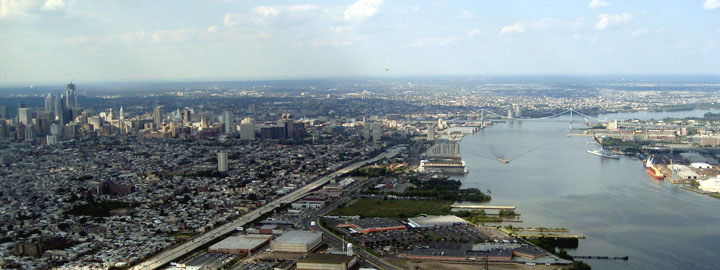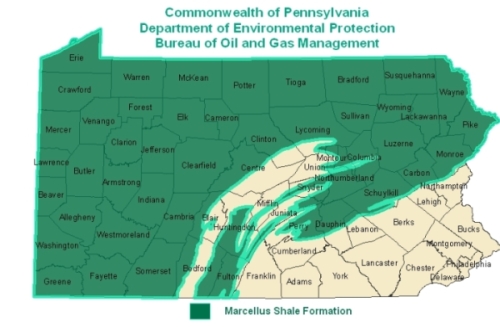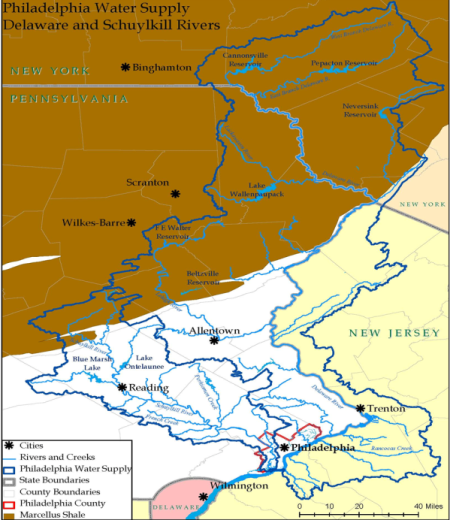Marcellus Shale Drilling In The Delaware River Basin

This page contains information from the Philadelphia Water Department about natural gas drilling in the the Delaware River Basin. Included are PWD's position paper on Marcellus Shale drilling in the Delaware River Basin, PWD Commissioner Howard Neukrug's March 3, 2011 letter to the Delaware River Basin Commission, frequently asked questions and additional resources for information.
Frequently Asked Questions
What is Marcellus Shale and why the sudden interest in it?
Is there natural gas drilling in the Philadelphia area?
Is natural gas drilling in the Philadelphia drinking water supply watershed (the Delaware River Watershed) expected to occur?
What governing bodies regulate Marcellus Shale drilling in the Philadelphia drinking water supply?
How is Marcellus Shale drilling regulated in Pennsylvania?
How are drinking water aquifers protected from contamination during the drilling process?
As a water utility, how does PWD approach the issue of Marcellus Shale drilling in the drinking water supply?
Does PWD support or oppose drilling for natural gas in the Marcellus Shale?
What does PWD do to prevent contamination in our drinking water supplies?
Philadelphia Water Department September 2013 Position Statement
City of Philadelphia Water Department
Septemeber 2013 - Position Statement on Marcellus Shale Drilling in the Delaware River Basin
The Delaware River Basin provides Pennsylvania with abundant and valuable natural resources. For centuries, the pristine forests of the northern portion of the basin have provided clean water to support Philadelphia and Southeast Pennsylvania’s vibrant economy. Today, the Philadelphia Water Department provides that clean water to 1.8 million people in Philadelphia, Bucks County, Montgomery County and Delaware County. The assurance of a sustainable, clean source of drinking water for our citizens is our pledge for today and for generations to come.
Natural gas extraction from the Marcellus Shale presents a significant economic opportunity for communities and landowners above the deposits; however, this drilling will impose currently unknown costs on Pennsylvania’s water supplies. Drilling activities are projected to impact thousands of acres of land upstream from Philadelphia in the next five to ten years. The scope, scale, and speed of the proposed drilling and related activities within the Marcellus may be as significant as the coal mining boom of the late 19th and early 20th centuries. The coal mining boom of the past has lessons for today. It fostered incredible economic development, but 21st century taxpayers continue to pay to remediate the environmental harms. Any natural gas development in the basin should not impose costs on future generations.
Proposed Regulations
Philadelphia has an immense civic and moral responsibility to provide our citizens with the safest, highest quality drinking water. The quality of our tap water is intimately linked to the health, vitality, and quality of our watershed, rivers, and communities. The Marcellus Shale formation underlies roughly half of the watershed area influencing Philadelphia’s water supply, and thus, all activities related to natural gas extraction present new challenges to the quality and safety of our water resources. For this reason it is the responsibility of the City of Philadelphia and PWD to work with regional industry and regulatory partners to ensure that all natural gas drilling is performed with full respect for Philadelphia’s drinking water.
PWD continues to actively follow and track the development of this industry in other communities throughout Pennsylvania and the United States. Currently, the regulations necessary for natural gas drilling to occur in the Delaware Basin have not been approved by the Delaware River Basin Commission (DRBC). The DRBC has legal authority over both water quality and water quantity related issues throughout the basin.Until the proposed regulations have been voted upon and approved by the DRBC, no natural gas drilling is permitted in the Delaware Basin.
TheDRBC states, “The scientific and policy questions that the commission must resolve in the course of preparing natural gas regulations are extremely complex, and the stakes for the larger region are high. Over 15 million people in four states rely on waters of the Delaware River Basin for drinking water, recreation, commercial, industrial, and other uses. It is vital to the future of the entire region for the commission to strike the appropriate balance between the use of the region's water resources for one purpose, natural gas exploration and production, and competing uses of the same water resources for drinking water supply and to meet other human, economic, and ecological needs.”
Additionally DRBC states,“Any decision to move forward regarding adopting regulations for natural gas development will come from the commissioners. There is no timeframe for when the regulations will again come up for a vote, which would occur at a public meeting.”
The City of Philadelphia and PWD will continue to review and comment on any additional changes pertaining to the proposed regulations.We believe that with the proper regulations and legislation, continuous monitoring and careful controls on the discharge of fracking waters, the waters of the Delaware and our drinking water intakes may be protected. PWD is expecting that the Delaware River Basin Commission (DRBC) Regulations will provide an adequate framework for protecting Philadelphia’s drinking water sources, if faithfully adhered to by industry and diligently enforced by the DRBC.
PWD submitted comments to the DRBC regarding the draft regulations in 2011. In our comments at that time PWD supported—and suggests enhancements to—the proposed DRBC Regulations for water quality monitoring to meet Safe Drinking Water Act standards, and for drilling companies to provide substantial financial assurances for remediation. The proposed regulations permit a total of 300 wells to be drilled in the basin over an 18-month period, after which DRBC will conduct a regulatory reassessment. It is PWD’s expectation that if new scientific findings occur during the 18-month evaluation period, that these findings will be incorporated into future regulatory policies relating to natural gas extraction. PWD will continue to review the information provided by the regulatory and scientific community regarding drilling activities upstream that may affect our drinking water and will immediately raise any concerns if it believes that drinking water safety is compromised.
Additional Actions
PWD seeks to partner with the Commonwealth, DRBC and industry on the following additional actions to protect the water supply for all communities that rely on the Delaware River Basin.
- A moratorium on the permitting of additional wells pending the findings of DRBC's regulatory assessment in 18 months. Assessments must be performed in a thorough and robust manner, with sufficient sampling data, a quality assurance/quality control plan and a model that can provide a high degree of certainty regarding its conclusions.
- A commitment to cease drilling during the 18-month assessment period should water quality or other monitoring data show an increase in sentinel water quality parameters—beyond natural or seasonal fluctuations—until the cause of the increase is ascertained.
- A cumulative impact analysis of the long-term implications of natural gas extraction on our drinking water supply and a commitment to update regulations to address results of the study.
- Legislation for impact fees that allocates funding to DRBC to develop and maintain an aggressive sampling program to help protect the river and support DRBC’s 18th month assessment. It is in every party’s interest to have a robust sampling program in place. In addition, impact fees should be available to reimburse water utilities that are committing to their own sampling program in response to drilling. Currently, the proper water system monitoring for the exotic and radioactive constituents from hydrofracking is estimated in the hundreds of thousands of dollars per year for Philadelphia. Philadelphia ratepayers should not be burdened by the additional costs to ensure its water is safe.
- The phase-in of drilling activities in the basin that are deemed safe to occur coupled with a process that allows for examination and evaluation of impacts and how the regulations are implemented in order to identify improvements for future protections.
- Full reforestation and restoration of lands cleared to accommodate drilling and related activities (including access roads) when drilling is complete, as required on state game lands and forests.
- Participation in the Delaware Valley Early Warning System (EWS) from all dischargers, facilities, and transporters of drilling wastewater to notify Philadelphia of accidents and water quality events upstream.
- Installation of continuous monitoring probes, funded by the natural gas industry, at priority surface water locations to provide advanced notification of accidents and spills via the EWS.
- Expansion of land application prohibitions to include treated wastewater and solids produced from the treatment of brines from natural gas well pads (i.e. road salt applications).
- A tri-state commission (Pennsylvania, New Jersey and New York) to guide land management issues as they relate to the special protected waters and the wild and scenic waterways of the Delaware River and the establishment of a public forum for information exchange to keep all interested citizens up to date on gas drilling impacts and strategies.
Marcellus Shale FAQs
What is Marcellus Shale and why the sudden interest in it?
The Marcellus Shale is a geologic formation that is believed to hold trillions of cubic feet of natural gas.
The U.S. Geological Survey has prepared a fact sheet that describes what Marcellus Shale is, and how much natural gas may be contained in the formation.
Is there natural gas drilling in the Philadelphia area?
No. There is no Marcellus shale beneath Philadelphia or the nearby counties, therefore there will be no drilling in the Philadelphia area. Additionally, the Marcellus Shale does not underlay Delaware, Bucks, Montgomery, Chester, Berks, or Lehigh counties. The map below depicts the areas underlain by Marcellus Shale in the state of Pennsylvania:

Image: PA DEP
Is natural gas drilling in the Philadelphia drinking water supply watershed (the Delaware River Watershed) expected to occur?
Yes. Natural gas drilling is expected to occur over 100 miles from the City of Philadelphia, within the northernmost reaches of the Delaware River watershed. The map below depicts the areas of Marcellus Shale contained within the Delaware River Basin:

What governing bodies regulate Marcellus Shale drilling in the Philadelphia drinking water supply?
The Pennsylvania Department of Environmental Protection’s Office of Oil and Gas Management reviews and issues oil and gas drilling permits, inspects oil and gas drilling operations, and responds to complaints regarding oil and gas development. The Delaware River Basin Commission (DRBC) is also responsible for safeguarding the basin’s waters from the effects of natural gas development activities. Other agencies that monitor the effects of drilling on water quality and aquatic life include the Pennsylvania Fish and Boat Commission, the U.S. Environmental Protection Agency, the United Stated Geological Survey, the U.S. Fish and Wildlife Service, and county conservation districts.
How is Marcellus Shale drilling regulated in Pennsylvania?
Oil and gas exploration are regulated under Title 25 of the Pennsylvania State Code (see links to relevant chapters below).
Chapter 78: Oil and Gas Wells
Chapter 95: Wastewater Treatment Requirements
Chapter 102: Erosion and Sediment Control
Interstate agencies, such as the Delaware River Basin Commission, are working to adopt regulations to complement state regulations by providing additional water quality and protection.
How are drinking water aquifers protected from contamination during the drilling process?
Natural gas deposits are located below groundwater aquifers, and drillers are required to implement methods that protect the groundwater supply. Drillers install steel and cement barriers called casings, which are designed to prevent liquids used in the drilling process from mixing with groundwater in aquifers.
As a water utility, how does PWD approach the issue of Marcellus Shale drilling in the drinking water supply?
Protecting Philadelphia’s drinking water sources is a primary mission of PWD and the assurance of a sustainable, clean source of drinking water for our citizens is embedded in all PWD operations. Therefore, PWD has been actively following and tracking the development of the natural gas industry since its introduction in Pennsylvania. PWD will continue to closely monitor projects upstream that may affect Philadelphia’s drinking water and will be the first to raise any concerns if there is the potential for drinking water safety to be compromised.
Does PWD support or oppose drilling for natural gas in the Marcellus Shale?
PWD believes that with proper regulatory oversight, the drilling of natural gas may be undertaken in a safe and environmentally sustainable manner. In order to accomplish this goal, PWD’s preference would be for a long term cumulative impact study to be performed. In the absence of this, PWD will continue to work with our regulatory partners to require proper regulations and legislation, combined with continuous monitoring and careful controls on the discharge of wastewater, to ensure the protection of the Delaware River and PWD’s drinking water intakes. For a more detailed summary of PWD’s overall Marcellus Shale policy goals, please refer to the position paper above or download it here.
What does PWD do to prevent contamination in our drinking water supplies?
PWD monitors its drinking water every day at its three water treatments plants and at points throughout its 3,000 mile delivery system. Our water is consistently better than Safe Drinking Water Act (SDWA) standards and has always met all heath standards. PWD also maintains and operates the Delaware Valley Early Warning System, which has the ability to mass notify downstream intakes if a contamination event occurs. PWD also continuously monitors water quality throughout the Schuylkill and Delaware watersheds.
PWD has a nationally recognized Source Water Protection Program. PWD’s Source Water Protection Program embodies the department’s multi-barrier approach to ensuring the safety and quality of Philadelphia’s drinking water. Philadelphia’s Source Water Program staff work closely with the department’s treatment plant managers and operators to anticipate and respond to emergencies and challenges to conventional treatment techniques. The Source Water Protection Program takes a scientific approach to understanding Philadelphia’s water supply characteristics, including water quality conditions, major sources of actual and potential contamination, water availability, flow patterns and management practices, and tidal and reservoir impacts.
Additional Information
Visit the Pennsylvania Department of Environmental Protection's Marcellus Shale webpage.
Visit the New York Department of Environmental Conservation’s Marcellus Shale webpage.
Visit the Delaware River Basin Commission’s Marcellus Shale webpage.
Visit the Environmental Protection Agency’s hydraulic fracturing webpage.
See EPA’s response to FAQs regarding the Marcellus Shale.
See PADEP’s response to FAQs regarding the Marcellus Shale.
See PA Department of Conservation and Natural Resources' response to FAQs regarding the Marcellus Shale.